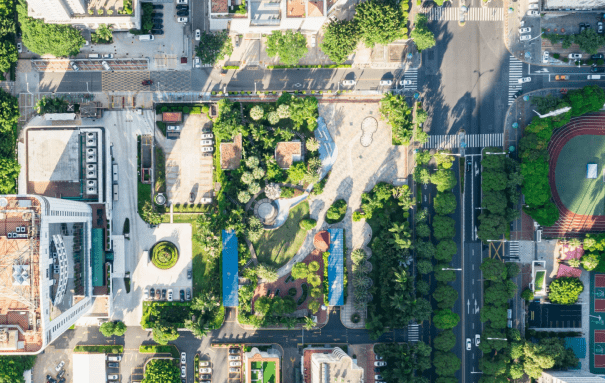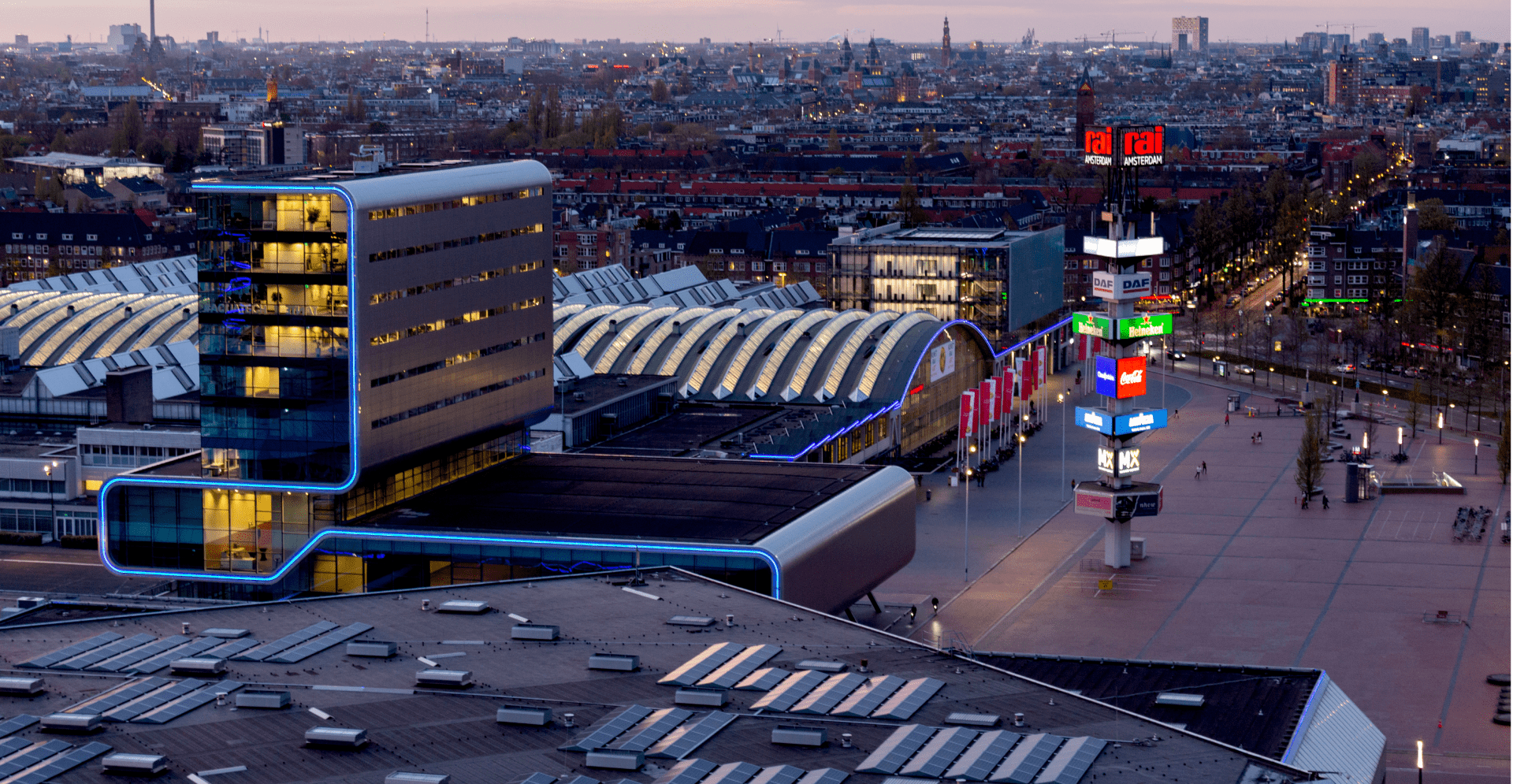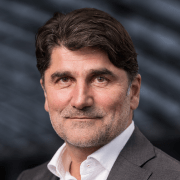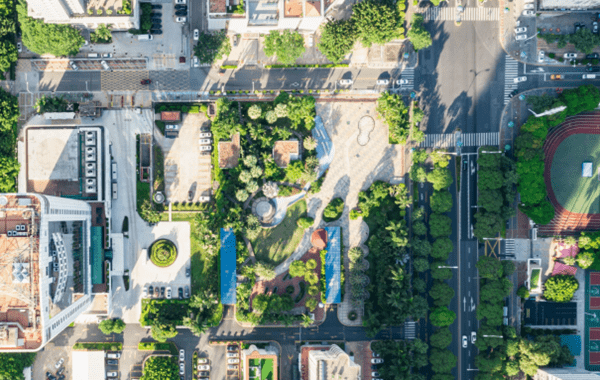Located in the heart of the city, RAI Amsterdam is one of Europe's premier convention spaces and welcomes hundreds of thousands of visitors each year. In this episode, we spoke with the organization's CEO, Paul Riemens, who is on a mission to revolutionize the way they do business and truly contribute to a more sustainable Amsterdam.
You have not accepted cookies yet
This content blocked. Please accept marketing cookies. You can do this here.
Subscribe on your favourite platform
CEO Paul Riemens talks to us about the important role his organization, RAI Amsterdam, plays in the economic landscape of the Dutch capital. It’s estimated that every euro that is spent at RAI Amsterdam translates into an additional seven euros of spending elsewhere in the city. But in-person convention center events have a significant sustainability impact on the city from the visitors traveling to and from Amsterdam, to the logistics of shipping goods and display materials to the event location, as well as the energy used and subsequent carbon generated by operating the event facilities.
The global pandemic essentially shut down RAI Amsterdam as in-person events were prohibited. This raised serious questions about whether these types of events would be needed in a post-pandemic world. In our conversation, Paul talks about how his organization has bounced back stronger from COVID-19 and his belief that by being transparent about the sustainability challenges his company faces, he is better able to collaborate with stakeholders to find solutions that can have a tangible positive impact on the city.


The Arcadis global podcast
Better Cities by Design
Episode transcript:
We recognize that not everyone is able to listen to our podcast, which is why the show is also available in text. If you would prefer to read what happened in the show instead of listening, please click the link below for the episode transcript.
-
Read full transcript
00:05
Davion Ford
Welcome to Better Cities by Design, a podcast brought to you by Arcadis, where we talk to changemakers who are working to make our cities better places for people to live, work, and play. I'm your host, Davion Ford. This week, we're going to Amsterdam for a conversation with Paul Riemens, Chief Executive Officer of RAI Amsterdam, one of the world's leading international trade fair and conference organizations. And we're going to discuss how Paul and his team are working to transform their business from being a traditional events location into a space that is not only sustainable, but also contributing myriad other benefits to Amsterdam and its residents.
00:53
Davion Ford
The Dutch city of Amsterdam has an outsized reputation around the world. It's known for the belt of canals in the center of town and the prevalent use of bicycles as a primary mode of transportation for hundreds of thousands of city residents. You can also find many museums in Amsterdam filled with priceless works of art from artists like Rembrandt, Johannes Vermeer, Vincent van Gogh, and Piet Mondrian to name only a few. The Dutch capital is also famous for its long-standing tolerance of the sale of cannabis for personal consumption, and the attendant coffee shops dotted throughout the city center. These and many other aspects of the city have made Amsterdam one of the most visited places in Europe. The Amsterdam City Council estimates that around 21 million people visit the city annually. But tourism isn't the only reason people visit the city. Amsterdam is in a prime location making the city a magnet for business travelers. A flight from either London, Paris or Berlin to Amsterdam, well, they all take less than 90 minutes. According to Statista.com, in 2019, before the COVID-19 pandemic, business travelers accounted for 5 million overnight stays in the city. And one of the main destinations for these business travelers is RAI, Amsterdam, which is located in Amsterdam's business district, the Zoudas, less than 10 minutes away from Amsterdam's International Airport Schiphol. Spelled R-A-I, RAI began as an organization in 1893, as an association for the bicycle industry. At that time, there was no convention center to speak of, and the exhibitions were organized in an exhibition hall in the city, which was destroyed by a fire. In 1922, RAI took its own space in the city, but moved to its current location in 1961 on the Europa Square, where the organization has continued to flourish. The historical significance of right sorry, I clapped. The historical significance of RAI, Amsterdam for the city is difficult to overstate. Here are just a few of the highlights. In 1964, US civil rights activist, the Reverend Dr. Martin Luther King Jr. gave a sermon at RAI. RAI has also welcomed some of the world's most famous musical artists, including Ike and Tina Turner, Frank Sinatra, Kiss, and U2. And at the 22nd edition of the International AIDS Conference in 2018, former US President Bill Clinton and British Prince Harry spoke at the RAI about the impact HIV and AIDS was having on the world. Add to this the thousands of conventions and exhibitions that have been held there over the years, and you start to get a sense of how important RAI Amsterdam is for the city. It's estimated that every euro spent at RAI, Amsterdam generates an additional seven euros of revenue for businesses in the city. But having a massive international convention center like RAI also costs the city and its residents in terms of the sustainability impacts. For more on this, here's Arcadis' Global Director Energy Transition, Caroline Gehrels.
04:02
Caroline Gehrels
The RAI has specific challenges because of the 70,000 diesel trucks that are entering the city there every year. And I think we can reduce that amount to zero when we change the logistic concept. The RAI has made a master plan and that's based on a more sustainable neighborhood with reuse, reduce, recycle as design principles. So reduce the energy you use, the water you use, reuse it when it's possible, when it comes to water and buffering, etc. And recycle, that means that you can buffer your electricity as well when you make an energy and a mobility hub at the same time. And that's what the RAI is doing and that's really exciting, because so far with the savings they earn a lot of money as well.
04:54
Davion Ford
To learn more about this transformation, I'm happy to welcome to the show Paul Riemens, Chief Executive Officer of RAI, Amsterdam.
05:09
Davion Ford
Hello, Paul, welcome to Better Cities by Design.
05:12
Paul Riemens
Hi Davion!
05:13
Davion Ford
So to start off, can you tell our listeners about the RAI Convention Center and what it contributes to the city of Amsterdam from an economic standpoint?
05:21
Paul Riemens
If you look at the RAI, it's some sort of a time machine because the company exists for about 130 years old. A couple of years ago, we have written a book when it was 125 years old. And then you see the rich history and that this business is totally connected to the city of Amsterdam and where it all started. Initially, it was in the city center where it had exhibitions and conferences around bikes. And shortly after that, it was about cars. And then it really expanded and it built a new convention center, not at the current location, but still in the city center. But because of the expansion on mobility, but sometimes also on other topics that were of importance to the economy of Amsterdam. That expansion resulted into a new exhibition center at the current location. In those days, in the 60s and 70s, these were the outskirts of Amsterdam. But if you now look around, you know, it's with all kind of communities around us, people that live, work, sports and do all kind of things that are, I would say, normal for a city. So the role, the RAI plays is I think not only for the economy, but brings much more value to the city.
06:55
Davion Ford
So maybe you can expand upon that about the value that the RAI brings to the city. What does that look like? And there was a particular stat, I think that for every euro that is spent at the RAI, it translates to about seven euros of economic activity for the rest of the city, is that right?
07:13
Paul Riemens
Yeah, that's correct. You know, so, so what you have seen, I think in the past decades, and I think that counts for a lot of companies in the world, especially in cities, that they are focused on bringing economic value. But because land is so scarce, and people are so close to each other with functions, whether it's about living, about working. So, we need to review our position in the city. So, I think the economy is very important if you look to the position of the RAI, but you know, we add value to hotels, to taxis, to organizers. But what you see is that the people, the society, pay also I would say in an indirect way in what we, I would say, take. And that might be congestion, that might be CO2 emissions. So, there's a lot of, I would say, what we take from society and the value we'd like to bring to society. And I think there's some sort of a shift that it's not possible to position the RAI only as an economic motor.
08:36
Davion Ford
I think that's a really good point, Paul. And I know that over the nearly 20 years or so that I've lived here in Amsterdam, I've been to many events at the RAI and it's great having a world-class convention center and town, it's brought lots of people that I know from all over the world here to Amsterdam, which has been nice to get an opportunity to visit with old friends that I hadn't seen in a while. But the very nature of these big events is that they present some big sustainability challenges as well. And in your tenure as CEO of the RAI, you've been really focused on this issue. Can you tell us a bit, and you spoke about that just now, but a bit more about the sustainability issues you've been working to address, what you guys have been able to do to make things better and critically what that impact has been.
09:19
Paul Riemens
I think in the last 15 years, you see a lot of discussions about sustainability and what is a sustainable future for your business. And I think you start, let's say, on the negative component in what you take from the world or what you take from society. And that might be things like you're producing a lot of waste, as an example, or a lot of noise or well in every direction. So, what we have done in all those years is try to be modest about how much noise and waste we make. But if you look to your processes and the value chain and the RAI is a component in the value chain, you see that bringing down the amount of energy that you use or your CO2 emissions with the current setup of the company that can easily be done to a certain level. But we have come to, I would say, a level where we say, listen, if we really want to do something about CO2, about how much energy we take, how much waste we make, we really need to think about how we have designed the value chain. So, If I organize or you organize an event in Amsterdam, it might be in every direction. And you have an exhibition with, let's say 10,000 square meters with small booths that are produced and manufactured in Poland or Bulgaria or Germany for the lowest price. And you bring these booths via trucks and lorries to Amsterdam. It might be lowest price, but society pays an enormous amount of emissions, congestion, the production of infrastructure. So, the current setup only based on euros or money is giving the wrong incentive for redesigning your value chain. And that's where the RAI said, listen, we need to revisit our value chain. And I cannot only position the RAI from an economical point of view.
11:56
Davion Ford
That's fascinating. We're gonna come back to this topic about really that business model piece, but I wanted to ask you, last year I had the pleasure of attending this Shortest Day of the Year event, which was a thought leadership dinner at the RAI, and that's first time that I got an opportunity to meet you. And I remember walking through part of the building that we were in, that wasn't actually being used for the event that we were there for, and the lights were off. And initially walking through and thinking, Why the heck is it so dark in here? And then my light bulb went off and I realized, well, yeah, this space isn't being used right now. And even though it's evening, there's no reason for there to be lights on here. And I don't need the lights just to walk through this corridor a few times. So, I could really see that you guys have built intelligence into that facility as far as that goes. And I know you've accomplished a lot in making the RAI more sustainable, but maybe you can talk a bit about your vision for the future of the RAI Convention Center.
12:58
Paul Riemens
I think based on what I just said in the last question, I think the most valuable part we take from society is space. Because we have 25 hectares of, I think, the most expensive land in the Netherlands. And of course, we have that ratio, one euro and seven euro to the city. But if you live, let's say, in Amsterdam, Southeast, you have no idea where your prosperity comes from, whether it is direct, indirect. So, we said, listen, if we want to continue operating on this land, we need to think about what kind of value do we bring and what kind of value do we take. The city has a huge, I would say, challenge to transform energy and its production and its infrastructure. It needs to think about housing. It needs to think about education. Uh, it needs to think about mobility. Now the RAI, because this piece of land and how we are connected to the world is such a vital infrastructure. So, we said, listen, if we, if we position the RAI, not only organizing events and, and, and conferences or exhibitions, if we are a node in the transformation of energy. So, if we locate huge batteries, might be underground or somewhere around in this area, we might play a role in the energy transition. The city is so crowded and there are so many cars parked in the city that the policy of the city is to get rid of all those cars and to have a much easier infrastructure where residents move by metro, it might be bikes, it might be everything and the RAI could play an important role in being a node in such an infrastructure. Same thing is for logistics. If you bike around the city of Amsterdam, you see that the canals and all those tiny little streets give only a little bit of room to logistics. So, if you order, uh, let's say a pizza and this has been brought into the city, a car is almost impossible. The maintenance and the price for maintenance for these canals is immense. So, there is currently a vision, where we have a city center without cars and where different network nodes play a role in these mobility and these logistics. If you see the RAI, we might have different revenue streams based on these needs. And that's where I would say multi-value positions RAI comes into the place. So, what we foresee is that the RAI will be cleaned up. There will be a totally new a way of logistics. It will be circular events that gives us room to build offices, housing, mobility hubs, hub for logistics for the city. So, there are so many possibilities in, I would say, redesigning the value chain and changing our setup for, I would say, the broader part of Amsterdam.
17:01
Davion Ford
So, part of what you said earlier has led me to this next question where you were talking about how, um, not everyone living in and around the convention center necessarily feels the value. For instance, that seven euros that is generated as a result of a euro being spent at the RAI, someone living in some part of our Amsterdam doesn't really have a tangible feeling of like, that's the benefit they're getting from the RAI. Um, so. That seems like an obstacle in the way of achieving what you want to achieve. Can you talk about that and any other, let's say, challenges in the way of fulfilling that vision that you have?
17:36
Paul Riemens
Yeah, let me give you an example. If we clean up the place by redesigning our logistics. 4.5 hectare which is currently used as a parking place or a place where you see all kinds of logistics and these kinds of activities necessary for building up an event or conference or whatever. You see that people that actually live around the RAI have a house. If we redesign the value chain, I know that the price for these houses will become higher. Now, if you have a house. Yeah, let's say as a neighbor of the RAI and I do this kind of investment. There is a wind for you. However, if I ring your bell and I say to you “Listen, you had, let's say, a higher price for your house for let's say 15%. I think it's fair that I get 5% of that value.”
18:42
Davion Ford
I don't think that you're going to be able to sell that one.
18:44
Paul Riemens
Now, you see this imbalance all over the place. Because if I use a truck and it's a diesel. You pay for my emissions because you get it in your body and gives you, I would say, a less longer life. So, there are all kinds of imbalances. So, pricing for CO2, pricing for emissions, pricing for congestion. So, what we currently see is that we in the middle of a transition, we have no idea of how this transition actually look like. So, you see now pricing of CO2 emissions and these kind of things, but that's still in the beginning. So, on the one side, when I talk to the shareholders and my supervisory board, and I say, listen, we have a terrific future. We're gonna invest in a sustainable future. But then at the end of the discussion, they asked me, listen, Paul, but if we're gonna invest, this kind of money, are you going to pay it back? So, so on the one end, I need, I need to have a proper financial cost benefit, yeah, and a business model, but for a sustainable future, I need to also have a, I would say, a cost benefit analysis where costs are much broader than only euro and the benefits much broader than only my product of events, conference and exhibitions.
20:20
Davion Ford
I just want to wrap things up with something that I've noticed about you, Paul, which is that, you know, unlike some other, let's say, CEOs that I've interacted with in the past, that you speak really transparently about the challenges that your organization faces. And that's rare. What benefits do you and the RAI derive from this openness?
20:40
Paul Riemens
I just said that we're in a transition, you know? So, and let me give you a model. You have some sort of an S-curve, and I'm not whether you're familiar with that, you know, but if you start a company with a new concept, you know, it takes a lot of work to bring the concept alive, and then you try to scale up your businesses, and then you see a curve where it actually grows really rapidly, and then it comes to an end, you know? If I look to society and where we are, we cannot continue treating the world like what we do. So, you always see at the end of an S-curve, you see there's a lot of turmoil and fuzz and misunderstanding before it goes to a new S-curve. So, what I foresee is that in order to overcome, I think, these difficult periods, you know, because I have no idea, I cannot forecast future and there comes in what the benefits here. I cannot do it alone. The problems we are facing as RAI, and that's, I think, my domain, I cannot solve these problems alone. So, if I'm transparent in where I am and what my challenges are. And I trust the people sitting in front of me and I respect their problems. We might exchange problems and solutions without controlling, I would say, the battlefield or the room for possible improvements. You know, I think, what I've learned, if you start giving, you know, it will finally come back. So, it's a whole approach from control to opening up and sharing. And there's a complete set of values to make that work. But you know, it's dependent on your belief and philosophy.
22:54
Davion Ford
So on that hopeful note from you, Paul, thank you so much for your time. I'll wrap things up. It's been really great chatting with you.
23:01
Paul Riemens
Okay, very good.
22:54
Davion Ford
And that's it for this episode of the show. A big thanks to our guest, Paul Riemens, CEO of RAI Amsterdam. We're really excited about our collaboration with RAI , the city of Amsterdam and other partners aimed at future-proofing Amsterdam's global convention hub. Stay tuned for our future episodes as we continue to bring change makers to the table who are driving progress in urban development. And if you haven't already, be sure to subscribe and check out our other episodes. I'm Davion Ford and you've been listening. to Better Cities by Design, a podcast brought to you by Arcadis, the world's leading company delivering sustainable design, engineering, and consultancy solutions for built and natural assets. You can learn more by visiting our website, arcadis.com, or by following Arcadis on LinkedIn or Facebook. And please stay curious, get inspired, and remember, the future belongs to those who dare to make a difference in the cities we call home.



